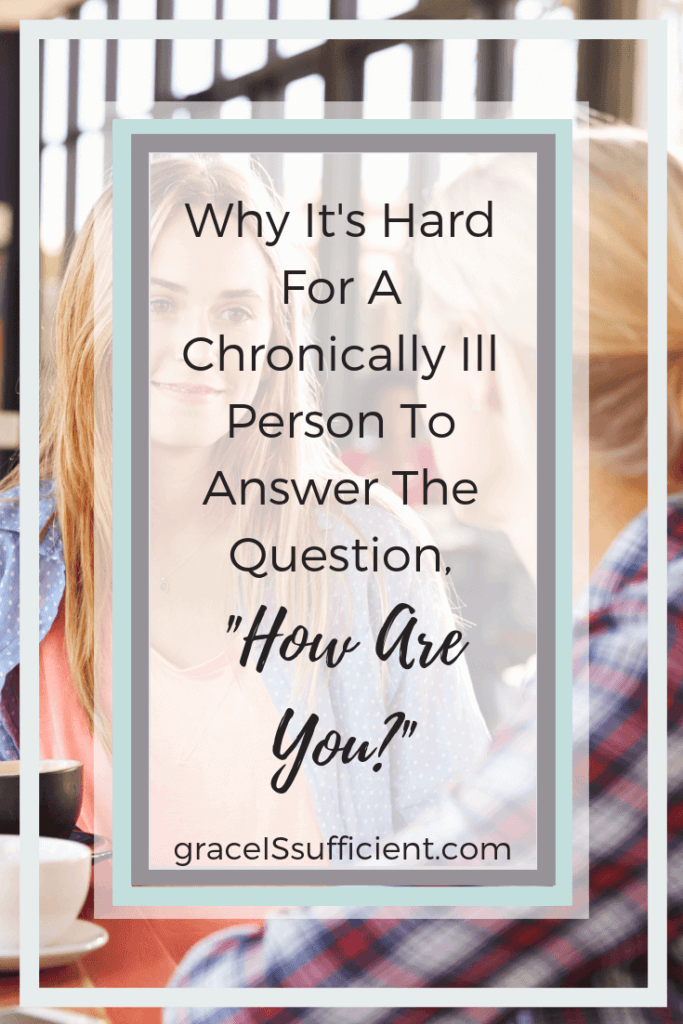The scenario plays out every day in all different aspects of our lives and it can leave us filled with so much inner turmoil.
You all know what I’m talking about. The dreaded question: “How are you?”
First of all, can I just get something off my chest? We all have a love/hate relationship with this question, don’t we?! We’re thankful for the loved ones in our lives that truly care and are concerned for our health. By simply asking this question we can feel their genuine support. But on the other hand, when others ask I’d love to answer with, “Have a seat, this is going to take a minute…..” or even, “I can’t remember what normal feels like.” But that isn’t the typical way we respond, is it? We try to be nice and chatty for the most part. So why does this question pose such a problem?
Why it’s hard for a chronically ill person to answer the question, “How are you?” :
-
- We don’t know if our answer will be misinterpreted as an exaggeration or whiney gripe session.
- The person asking probably has no idea how different we can feel from one day to the next or even from one moment to the next.
- We already feel alone and isolated so we don’t want to turn someone else away with a bunch of negative talk.
- If we answer with “good” will they think we’re finally cured?
- We don’t want pity.
- We don’t want to feel like a burden to others.
- If we tell them about a symptom we’re struggling with currently are they going to offer their advice or list off some article they’ve read with a cure for our illness that probably involves standing on our head while drinking the juice of 7 cucumbers, 1 cantaloupe, 4 green olives, 1/2 a tree root, and a gallon of pomegranate juice. (Breath, Kim……… Ok, I’ve calmed down!)
Some things to consider before you answer:
- Look at the circumstance around the question.
- Your answer is going to be different whether you’re at a family gathering, work, the store, or passing by a neighbor.
- Base your answer on your relationship with the person asking.
- Odds are, if it’s the lady at the checkout register or something like that, my answer will be, “Doing good! How are you?” You can just pick any answer – fine, better than I deserve, or whatever else you think of at the moment. This person doesn’t have a deep attachment to your answer and it was probably just said as one may say, “Hello.”
- Is it a close friend or family member that gives you a hard time and doesn’t seem very supportive? A brief answer that includes something your doctor said or recent test results might be a good way to add some credibility (in their eyes) to your illness.
- Is this person close, supportive, and understanding of your illness? You can go a bit further, time permitting, maybe even sharing your emotional status toward how you feel.
- You may want to respond positively and casually but, if you know the person, they may ask a follow-up question like, “How have you been doing with your new meds?”
- This changes things! Now you understand they are truly asking at a deeper level. Most likely this person does care about your illness and what you’re going through.
- But in the end, it’s like I always say, people won’t get it unless they get it.
- If we’re honest, we didn’t understand as much before we were sick either. Until someone lives a day in our skin, with our list of symptoms and meds, they can’t understand. They can be compassionate and empathetic but they can’t begin to know the extent of how it runs our lives.
Being chronically ill is devastating, isolating, and complicated to say the least. It forces us to know the limits of our bodies and also how very fragile they can be. It makes us long for support, comfort, and understanding friendships. Our illnesses are a part of our journey and considering these things before we answer, “How are you?” can benefit both ourselves and the person asking!





